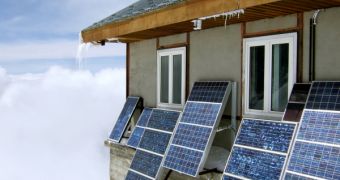American Building Technologies, a subsidiary of Mulk Holdings, a multi-national group based in the United Arab Emirates (UAE), has managed to devise a new method of producing solar energy at a 50 percent lower cost, while at the same time increasing the efficiency of the entire process. The new production system is several times lighter than previous photovoltaic cell systems, and has a 92 percent reflexivity rate, which makes it highly competitive as well.
“We hope the success of this project will lead to an upsurge in the development of more solar energy plants, which will not only lessen the strain on existing energy resources, but also severely reduce the pollution levels that are currently witnessed in power generation,” a Mulk spokesman says, commenting on the revolutionary breakthrough.
The new class of panels doesn't require rivets for its joining corners, which somehow makes it weigh about 4 kilograms per square meter, as opposed to the massive 12.5 kilograms per square meter an average glass-encased panel weighs. Aluminum-based designs are lighter than glass ones, but require large components to fix them, which drastically increase their weight. Rivets make the entire construction lose its reflectivity, and thus decrease efficiency.
“Alubond SCP is a 3 mm composite weighing approximately 4 kg per sq m with a 92-per-cent reflectivity. The product’s ability to retain a parabolic shape to precise coordinates, and its lightweight features and innovative rivetless joining process, substantially reduces the substructure costs,” the same spokesman adds.
The design has already been awarded its first contract, and will help power up the massive grid of a $200 million + facility to be constructed in New Mexico City. The construction will be finished in late 2009, and experts say that countries in the Gulf region and Middle East will have another option to consider for similar facilities they have planned, if the test for the SCP is successful.

 14 DAY TRIAL //
14 DAY TRIAL //